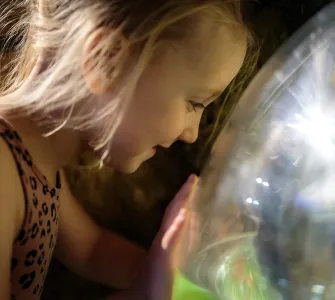The Deep is excited to present a winter event, ‘Polar Fest’ in partnership with the British Antarctic Survey and the Scott Polar Research Institute. The event will be a celebration of science and adventure amongst the most extreme elements in the world - the Polar Regions.
Explore the world of polar science including research into topics like the effects of climate change on the Antarctic, plastic in Antarctic oceans, Antarctic food webs, Alien invaders and the history of Antarctic exploration. Find out how researchers live and work in such challenging climates and why the work they are doing is so important, for the planet and all who live on it.
Katy Duke, CEO at The Deep said “We are delighted to be partnering with both the British Antarctic Survey and Scott Polar Research Institute this winter. The Deep is the perfect venue to showcase the fragile Antarctic continent which is so inaccessible yet hugely impacted by the actions of the rest of the world. It’s our opportunity to raise awareness for the ultimate winter wonderland and why it is so important for everyone.”
Make sure you pick up a trail sheet from reception, follow the clues to answer the questions to be in with a chance of winning some polar goodies! Visitors will be able to get hands on and learn real research methods applied by polar scientists and the science of snowflakes. Plus see real stomach content from an Albatross which includes plastics, litter and find out how plastics are effecting the oceans and the species who live in them. Find out how tall you are compared to different species of penguins including an extinct species which was 1.75m tall before warming up with a delicious hot chocolate and a sweet treat.
Continue your journey with a stop by the researcher’s field camp and find out what life is like for a researcher in the frozen Antarctic. Learn about the specialist equipment they take with them from sleeping bags and cooking equipment to different types of clothing to ensure they can survive in one of the most hostile and environments on the planet.
Find out more about the vast array of careers available through the British Antarctic Survey and the diversity of skills required to operate research stations in the Antarctic, from researchers and scientists to plumbers, chefs, cleaners and electricians.
Athena Dinar, who’s head of public engagement at British Antarctic Survey says “Explaining how are frozen worlds are changing in a warmer world is more important than ever before, so we’re delighted to be partnering with the Deep to bring polar science and operations to the general public in the north west.”
Charlotte Connelly, Curator of the Polar Museum at the Scott Polar Research Institute stated “We’re excited to be partnering with The Deep to share our polar research and knowledge with new audiences, in Hull, the home city of so many polar explorers, whaling captains and researchers over the last two centuries.”
For more information, please contact Zoe Montgomerie, Head of Communications & Marketing on 01482 381093 or email zoe@thedeep.co.uk
Supported by




Notes to Editor
- Antarctica is an ice-covered continent surrounded by ocean, the Arctic is an ocean covered by thick sea-ice and surrounded by the northern continents.
- Eighteen countries operate year-round scientific research stations on the continent of Antarctica and the surrounding islands.
- All countries working in Antarctica carry out scientific research in a range of physical and biological sciences – from the vastness of space to the minute scale of micro-organisms.
- Antarctica is the coldest, windiest and most remote continent on Earth.
- There are no polar bears in Antarctica.
- There are about 5 million penguins in Antarctica.
- The Antarctic Treaty (1959) designates the continent as a ‘natural reserve, devoted to peace and science’.
- As part of their expeditions, Scott and Shackleton undertook scientific research.
- Antarctic science is crucial for understanding how the Earth operates as a global system.
- In global terms 90% of the world’s ice is located in the Antarctic.
- The Arctic is the northernmost region of Earth.
- The Arctic’s thick, reflective sea ice moderates ocean temperatures around the world.
- Like the polar bear, many other animals of the Arctic are white: beluga whales, snowy owls, juvenile harp seals. This colouring helps camouflage them in heavy snow and ice.



